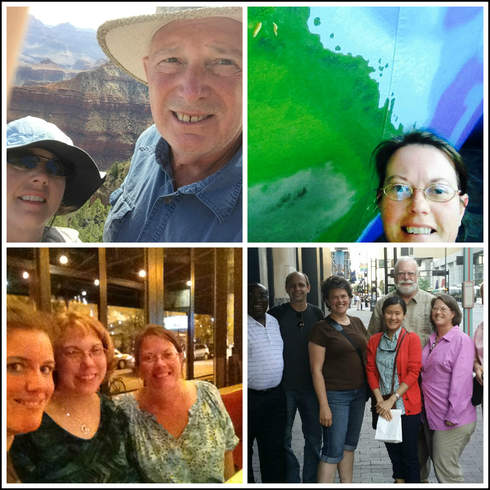“Not all those who wander are lost.” ~ J.R.R. Tolkien
I seem to have lots in common with the Hobbits of Middle Earth – including my wandering pathway to geographic education.
I studied agricultural economics at Texas Tech University. When I made the decision to seek teacher certification, I added six hours of geography to my course plan. One of the classes I took was Geography of Mankind, taught by NCGE award winner, Dr. Gary Elbow. We read Earth Abides by George R. Stewart, and The Word for World is Forest by Ursula K. LeGuin. I was hooked!
I taught high school geography in Texas before I made the decision to start a Ph.D. in geographic education at Texas State University-San Marcos. I met with Fred Shelley (then graduate coordinator at Texas State), Dick Boehm, and Lawrence Estaville about the “new” program at Texas State. Dr. Susan Hardwick was transitioning to Oregon, as was Susan Hume. I met Susan Hume and rented her apartment when I was accepted. I worked three of the four years of my assistantship at the Texas Alliance for Geographic Education (my voice is still on the answering machine). I was the 2001 Geography Awareness Week Coordinator for Texas, and traveled to DC with other GAW coordinators to work with Michal LeVasseur and Joe Ferguson of National Geographic Society.
I joined NCGE in 2000 when I started my doctoral studies at Texas State. I attended my first conference in Philadelphia, Pennsylvania. I worked a booth for the Texas State Department of Geography, and the Grosvenor Center for Geographic Education in exchange for my conference registration. I connected with other graduate students and met folks whose work I followed in my coursework. All of the people I met at the First Timers’ Breakfast, the Grosvenor Center booth, and in sessions welcomed me warmly into the community of professional geography educators.
Through my work with the NCGE, the Texas Alliance for Geographic Education, and the Grosvenor Center, I made connections with many award-winning geographic educators and past presidents of NCGE — Sarah Bednarz, Dick Boehm, Lara P. Bryant, Susan Hardwick, Susan Hume, Eric Fournier, Madeleine Gregg, fcJ, Joseph Kerski, Jodi Smothers-Marcello, Joe Stoltman, and so many others. All of my colleagues at NCGE contributed in some way to my growth as a geographer and geographic educator, whether it was how to design a quality research proposal, mentoring graduate students and junior faculty, or simply modeling good scholarship.
I returned to the high school social studies classroom in 2004, while I finished up my degree, and taught world history and world regional geography at Thomas Jefferson High School in the San Antonio Independent School District. Additionally, I taught geography for the Alamo Colleges at St. Phillips and Northwest Vista as an adjunct instructor. In 2007, I transitioned to full-time postsecondary education and accepted an appointment as the secondary social studies faculty in the School of Education at the University of Mississippi. I began serving on the Mississippi Geographic Alliance Steering Committee in 2009.
Additionally, I have worked with ETS on the Praxis II National Advisory Committee for Geography, and as a reader for the AP Human Geography exam. It was through my work with ETS that I met Kristi Alvarez, Paul Gray, Barbara Hildebrant, Ken Keller, and Kelly Swanson. The AP Human Geography program – the community of APHG teachers and readers – helped me more clearly see a future for geography in the K-12 classroom. Through their eyes, I have been able to see a future beyond place-name geography. While some geographic educators lament that ninth graders take the course in some states, I think this is a great opportunity to force students, teachers, and parents to think outside the box and redefine high school geography.
In 2009, then NCGE President Joe Stoltman asked me to fill the unexpired term of the Recording Secretary. I became the de facto parliamentarian and keeper of the institutional memory as presidents rotated off the board. I served NCGE in that capacity until my election as Vice President of Curriculum & Instruction, nominated by my friend and mentor, Kristi Alvarez. Being a non-voting member of the Administrative Committee (now the Board of Directors) provided me with an opportunity to understand our century-old organization and ask questions about how we can better serve our members and the greater community.
I am currently the Social Studies Teacher Educator for the University of Mississippi, named in the Grosvenor Center grant proposal (the DRK-12 Project). In terms of my teaching style, I tend to model the teaching I hope for my teacher candidates to use in their own classrooms, which is inquiry and/or problem-based, and very hands-on and relevant. My graduate students collaborated with leadership from the Natchez Trace Parkway National Park to create story maps and lessons to engage students in the geography of the Trace. I also created two graduate courses in geographic education for the University Of Mississippi School of Education to help better prepare teachers for the courses they teach.
I am excited to serve NCGE as the President of the (reimagined) Board of Directors (BOD). The modern system of governance for non-profit organizations will bring the organization strength as we move forward. The elected and appointed members of the BOD bring a variety of experience to our organization not only in their knowledge of geographic education, but of policy, investment, and governance. I look forward to working with each of them and sharing our work with you – our members.
We have been selling geography and geographic literacy to the American public for 100 years. Many of the problems we face today are not new. The October 2015 Government Accountability Office (GAO) report on the lack of geographic proficiency is old news, and all of this is very frustrating. Despite this, I’m motivated by the fact that folks continue to see the relevance of what we do as geographers and geographic educators. This is evidenced through the growth of AP Human Geography (and now the AP GIS proposal), and other recently funded projects like the Road Map to Geographic Literacy, and the new Every Student Succeeds Act, among others. In spite of the challenges we face, I feel that the time is right for great gains in geographic education and literacy. Geography is more important now than ever, and through collaborative work with other organizations (e.g. GENIP and NCSS) and disciplines, more students can learn about geography in a greater variety of places than ever before. Furthermore, the work of students in APHG classes and the ESRI/4H projects completed by middle and high school students is all very inspiring. My sincere hope is that NCGE continues to lead in the research and development of quality materials for geographic education that allow teachers and students to apply the geographic lens to problems that face us all – locally and globally.
Ellen J. Foster
Twitter: @ellenjfoster


